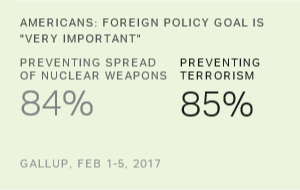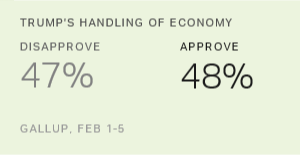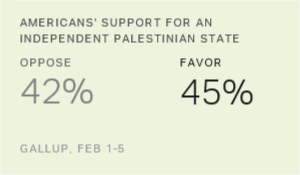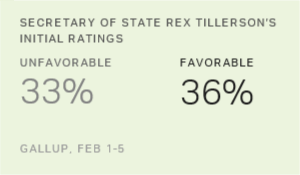Story Highlights
- More than four in five Americans say both goals are very important
- Defending U.S. allies' security has increased in importance
- Two in three say defending U.S. allies' security is very important
WASHINGTON, D.C. -- Preventing future acts of international terrorism (85%) and the spread of nuclear weapons (84%) remain Americans' top foreign policy goals in 2017, with more than four in five rating each of these as "very important." Nearly as many say securing adequate supplies of energy for the U.S. (80%) is a very important foreign policy goal.
| Very important | Somewhat important | Not too important/Not important at all | |||||||||||||||||||||||||||||||||||||||||||||||||||||||||||||||||||||||||||||||||||||||||||||||||
|---|---|---|---|---|---|---|---|---|---|---|---|---|---|---|---|---|---|---|---|---|---|---|---|---|---|---|---|---|---|---|---|---|---|---|---|---|---|---|---|---|---|---|---|---|---|---|---|---|---|---|---|---|---|---|---|---|---|---|---|---|---|---|---|---|---|---|---|---|---|---|---|---|---|---|---|---|---|---|---|---|---|---|---|---|---|---|---|---|---|---|---|---|---|---|---|---|---|---|---|
| % | % | % | |||||||||||||||||||||||||||||||||||||||||||||||||||||||||||||||||||||||||||||||||||||||||||||||||
| Preventing future acts of international terrorism | 85 | 12 | 3 | ||||||||||||||||||||||||||||||||||||||||||||||||||||||||||||||||||||||||||||||||||||||||||||||||
| Preventing the spread of nuclear weapons/other weapons of mass destruction | 84 | 9 | 6 | ||||||||||||||||||||||||||||||||||||||||||||||||||||||||||||||||||||||||||||||||||||||||||||||||
| Securing adequate supplies of energy for the U.S. | 80 | 16 | 3 | ||||||||||||||||||||||||||||||||||||||||||||||||||||||||||||||||||||||||||||||||||||||||||||||||
| Promoting favorable trade policies for the U.S. in foreign markets | 71 | 25 | 3 | ||||||||||||||||||||||||||||||||||||||||||||||||||||||||||||||||||||||||||||||||||||||||||||||||
| Defending our allies' security | 66 | 29 | 5 | ||||||||||||||||||||||||||||||||||||||||||||||||||||||||||||||||||||||||||||||||||||||||||||||||
| Working with organizations like the United Nations to bring about world cooperation | 63 | 21 | 16 | ||||||||||||||||||||||||||||||||||||||||||||||||||||||||||||||||||||||||||||||||||||||||||||||||
| Promoting and defending human rights in other countries | 53 | 34 | 13 | ||||||||||||||||||||||||||||||||||||||||||||||||||||||||||||||||||||||||||||||||||||||||||||||||
| Helping other countries build democracies | 29 | 43 | 27 | ||||||||||||||||||||||||||||||||||||||||||||||||||||||||||||||||||||||||||||||||||||||||||||||||
| GALLUP, Feb. 1-5, 2017 | |||||||||||||||||||||||||||||||||||||||||||||||||||||||||||||||||||||||||||||||||||||||||||||||||||
Solid majorities also say promoting favorable trade policies (71%), defending our allies' security (66%) and working with organizations like the U.N. to bring about world cooperation (63%) are very important foreign policy goals.
A smaller majority rated promoting and defending human rights abroad (53%) as being very important. Meanwhile, less than three in 10 Americans said that helping other countries build democracies (29%) is very important.
These results are based on Gallup's annual World Affairs poll, conducted Feb. 1-5.
Gallup last asked Americans to rate these foreign policy goals in 2013, as President Barack Obama started his second term. Americans are a bit more likely now than they were in February 2013 (66% vs. 60%) to say that defending U.S. allies' security is a very important goal.
Not only is this percentage up slightly from 2013, but it is also the highest Gallup has recorded since first polling on the question in 2001. Since then, a majority of Americans have consistently said defending allies' security is a top priority, ranging between 57% and 62% until this year's 66%.
Americans now are also more inclined to value working with organizations like the U.N. to bring about world cooperation and promoting favorable trade policies for the U.S. in foreign markets -- each up five percentage points since 2013 to 63% and 71%, respectively. The latter was a central tenet of President Donald Trump's campaign.
Perceptions of the other five goals are generally the same as they were four years ago.
| 2013 | 2017 | Change | |||||||||||||||||||||||||||||||||||||||||||||||||||||||||||||||||||||||||||||||||||||||||||||||||
|---|---|---|---|---|---|---|---|---|---|---|---|---|---|---|---|---|---|---|---|---|---|---|---|---|---|---|---|---|---|---|---|---|---|---|---|---|---|---|---|---|---|---|---|---|---|---|---|---|---|---|---|---|---|---|---|---|---|---|---|---|---|---|---|---|---|---|---|---|---|---|---|---|---|---|---|---|---|---|---|---|---|---|---|---|---|---|---|---|---|---|---|---|---|---|---|---|---|---|---|
| % | % | (pct. points) | |||||||||||||||||||||||||||||||||||||||||||||||||||||||||||||||||||||||||||||||||||||||||||||||||
| Defending our allies' security | 60 | 66 | +6 | ||||||||||||||||||||||||||||||||||||||||||||||||||||||||||||||||||||||||||||||||||||||||||||||||
| Working with organizations like the United Nations to bring about world cooperation | 58 | 63 | +5 | ||||||||||||||||||||||||||||||||||||||||||||||||||||||||||||||||||||||||||||||||||||||||||||||||
| Promoting favorable trade policies for the U.S. in foreign markets | 66 | 71 | +5 | ||||||||||||||||||||||||||||||||||||||||||||||||||||||||||||||||||||||||||||||||||||||||||||||||
| Preventing the spread of nuclear weapons/other weapons of mass destruction | 83 | 84 | +1 | ||||||||||||||||||||||||||||||||||||||||||||||||||||||||||||||||||||||||||||||||||||||||||||||||
| Promoting and defending human rights in other countries | 52 | 53 | +1 | ||||||||||||||||||||||||||||||||||||||||||||||||||||||||||||||||||||||||||||||||||||||||||||||||
| Securing adequate supplies of energy for the U.S. | 82 | 80 | -2 | ||||||||||||||||||||||||||||||||||||||||||||||||||||||||||||||||||||||||||||||||||||||||||||||||
| Helping other countries build democracies | 31 | 29 | -2 | ||||||||||||||||||||||||||||||||||||||||||||||||||||||||||||||||||||||||||||||||||||||||||||||||
| Preventing future acts of international terrorism | 88 | 85 | -3 | ||||||||||||||||||||||||||||||||||||||||||||||||||||||||||||||||||||||||||||||||||||||||||||||||
| GALLUP | |||||||||||||||||||||||||||||||||||||||||||||||||||||||||||||||||||||||||||||||||||||||||||||||||||
Bottom Line
Americans have concerns about how the world views the U.S., and less than four in 10 approve of the way Trump is handling foreign affairs. With majorities of Americans viewing the security of our allies and world cooperation through organizations like the U.N. as very important, actions that threaten these goals could further undermine the trust Americans place in Trump to handle foreign policy.
Trump broke with diplomatic norms while campaigning for president when he expressed hesitance about maintaining NATO, even calling it "obsolete." But Secretary of Defense James Mattis met with NATO officials this week to reaffirm America's commitment to the alliance.
Trump also previously criticized involvement with the U.N. as "wasteful" spending and sparred with the organization before taking office. The administration has drafted an executive order to audit and dramatically reduce U.S. contributions to international organizations, although Trump has not yet signed it.
At the same time, the president's focus on preventing international terrorism aligns with Americans' greatest priority, as does his commitment to renegotiating trade deals that are more favorable to the U.S. And while Trump has called for an arms race, his administration's measured response to North Korea's recent ballistic missile test could assuage fears of nuclear escalation.
Historical data are available in Gallup Analytics.
Survey Methods
Results for this Gallup poll are based on telephone interviews conducted Feb. 1-5, 2017, with a random sample of 1,035 adults, aged 18 and older, living in all 50 U.S. states and the District of Columbia. For results based on the total sample of national adults, the margin of sampling error is ±4 percentage points at the 95% confidence level. All reported margins of sampling error include computed design effects for weighting.
Each sample of national adults includes a minimum quota of 70% cellphone respondents and 30% landline respondents, with additional minimum quotas by time zone within region. Landline and cellular telephone numbers are selected using random-digit-dial methods.
View survey methodology, complete question responses and trends.
Learn more about how the Gallup Poll Social Series works.




